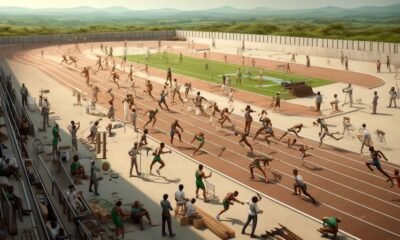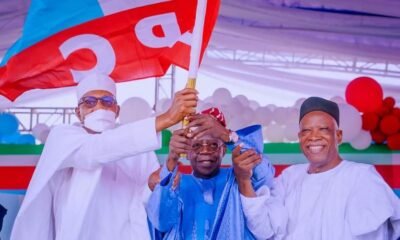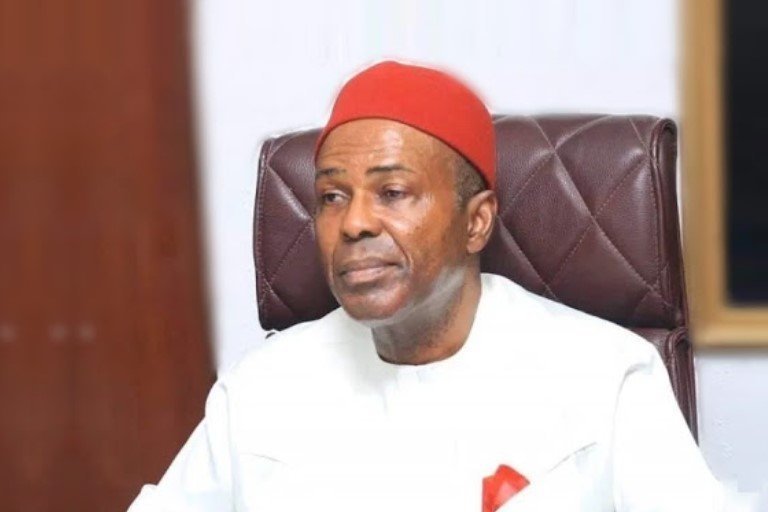News
The way forward for Nigeria by John Darlington

President Muhammadu Buhari is finding it difficult to turn the tide
As another federal elections year draw near with over three hundred political parties on the queue to slug it out with the governing All Progressives Congress, APC, there is every compelling need to focus attention on key areas where we got it wrong after 57 years of independence that has plunged the country into abysmal depths and to suggest useful corrections.
It is not only disheartening but well-nigh appalling that in spite of our abundant human and natural resources Nigeria still gropes marvelously in the dark with a cast of neophyte actors at the helm who churn out policies that keep Nigeria moving round in circles.
The resultant effect of this is abysmal failures while other countries gallop ahead in the long and circuitous race to economic growth and development which positively impacts on the lives of the citizenry.
Today in spite of the economic policies in place there is nothing to suggest that Nigeria is on the path to economic recovery nor is there anything to suggest that she is on the path to redemption.
Insecurity of lives and property is one knotty problem today that is rending Nigeria to shreds as she battles a deadly insurgency in the country’s northeast.
This doubtless has claimed no fewer than 20,000 lives and with its devastating and appalling demographic change.
Is it not a bundle of ironies and contradictions that hunger stares over 75% of Nigerians ominously in the face in a country that is blessed with vast agricultural potentials and that many go to bed on empty stomachs while the government in Abuja makes spurious claims of food export overseas?
This sad situation within this disheartening context, if we need reminding, reeks of dilemmas, ironies, and paradoxes as this promote crimes of varying degrees.
Attention must, therefore, be focused on key areas such as the economy, jobs, security, power, health, and transportation which are ambitious goals for a country where traditionally government-led change has become very slow and hopelessly ineffective.
All Nigeria urgently stands in need of under the existing circumstances is a political party whose manifestoes contain a scheme or plan as a blueprint for future development programmes.
Fortunately or unfortunately, these are non-existent in the governing party and the main opposition!
On Nigeria’s economy, we must now turn.The ruling All Progressives Congress has overseen an abysmal economic performance in the past two years with rising inflation and soaring unemployment figures.
For Nigeria to develop and record a strong economic growth she needs a political system that would be willing to create at least one hundred million new jobs for our teeming school leavers via Vocational Training and Youth Empowerment Scheme as obtains in advanced capitalist economies.
This will no doubt create a competitive business and investment environment capable of making Nigeria a world leader in manufacturing and agricultural production instead of over-dependence on oil as our main foreign exchange earner.
Similarly, also to be captured in the radar is a political system for a decentralized governance, more accountability, and a simpler regulatory environment that will bring about job creation as its primary economic objective.
This will in no small measure, promote honest business and entrepreneurship while manufacturing, agriculture and the service sectors will remain areas to focus on and develop.
To achieve these, there is every compelling need for the government to hands off running businesses and solely improve infrastructure to encourage private enterprises.
We must not also lose sight of the fact that a political system that will encourage a manufacturing-driven economy by waiving all taxes on exported products and applying minimum tariff protections to encourage local manufacturing, upgrade infrastructure and engage in more Public-Private Partnerships will reflate our comatose economy.
The moribund transportation sector needs to be revitalized and attention should aptly be given religiously to connect the remotest outpost to rail services thereby reducing pressure on our roads.
The larger part of Nigeria’s population must be moved to the middle class by strengthening traditional areas of employment like agriculture and retail through a rights-based approach by allowing every citizen the right to housing, health, and social security.
Attention must also be drawn to foreign investment by improving the policy framework.
There is no denying the fact that Nigerians also groans under the crushing effects of hyperinflation.
It is very disheartening that all the policies put in place and being implemented by the APC government to stem inflation and increasing food prices have failed woefully due to a wrong approach and failure to map out a development model to grant every citizen access to food, housing, education, healthcare, power, and water.
Halfway into the life of the Buhari government, it has been engulfed in numerous corruption scandals, a government during its inception that promised Nigerians to give the highest priority to accessibility and transparency in governance systems, track down and recover stolen funds that have been stashed away in foreign bank vaults.
The question that agitates this writer is how many of these repatriated stolen funds have been used to reflate the economy and develop the country?
What is certain here is that far from genuinely fighting corruption, the central authority has not only been hijacked by a criminal cabal but by conspiratorial intrigue, maladministration, gross incompetence of the governing All Progressives Congress with its avowed declaration to bring in transparency in Government’s decision-making process suffering a humiliating setback.
In fact, it has failed woefully to establish a system capable of eliminating corruption via effective reactions between citizens and government, simple tax systems and government processes.
To successfully bring the endemic problem of corruption to a standstill, Nigeria urgently needs a political system that will deal decisively with the canker worm by increasing the use of technology to reduce graft, setting up an anti-corruption ombudsman and not the EFCC which is a toothless bulldog.
The is also every need to bring in a stronger piece of legislation that applies to all public officials including ministers, sack jail offenders found guilty of corruption without fear or favour and have their assets confiscated and forfeited to the state.
Nigeria’s current education system is not only pitiful but chaotic as the common man does not have access to high-quality education.
Strikes by the academic and non-academic staff often disrupt the school calendar.
Be that as it may, a responsible government should be able to expand higher education opportunities for students in low-income families, make education free and compulsory for children aged 5-18, open up the higher education sector to foreign investment and increase skill development programmes.
But back home in Nigeria, the reverse is the case as young children who attend school do not learn basic skills like reading and writing, and graduates of higher education often find themselves unemployable due to poor quality education or a lack of job opportunities.
Emphasis should, therefore, be placed on encouraging more firms to hire apprentices and improve monitoring of certifications, quality of education, ensure universal enrollment in secondary education with a view to reducing drop-out rates.
Again, Nigeria must run or evolve a political system that would abolish illiteracy and pledge to men and women alike all possible help to continue and complete their education, develop closer interaction between education providers and industry, improve the quality of teaching, and set up online courses to further their education.
A large number of vocational training institutes that would provide incentives to students to establish their own enterprises is also deemed absolutely necessary at this juncture.
How achievable are these? Which of the political parties has a clue to the barrage of problems enumerated above that has given rise to ethnic agitations threatening our corporate existence as a nation?
As you can see from the foregoing, there is no gainsaying the fact that our country suffers hopelessly from too many problems ranging from our individual complexity to frustration factor, we have the poor and the common wage earners while unemployment is a national phenomenon promoting crimes particularly violent ones.
In my own unshaken conviction, the totality of this broad spectrum of our population must be fully mobilized in a truly nationalistic sense.
My sainted aunt! It is a thousand pities that in spite of the petrol-dollar windfalls of the 70s, Nigeria has nothing on the ground to show for it apart from infrastructural decay, appalling failures which have resulted in stunted economic growth and development.
This worries my soul!
The new and intriguing third force in Nigerian politics – the Green Party of Nigeria (GPN) with its bewildering array of firebrand revolutionaries has possibly more ambitious goals to abolish corruption and contain communal violence, insecurity, hunger, unemployment and the ongoing ethnic agitations threatening our corporate existence.
To implement the above-mentioned programme of action, the Green Party of Nigeria under the able and dynamic leadership of Major Hamza Al Mustapha has assembled a qualified team for the great task ahead to regenerate Nigeria.
Major Hamza Al-Mustapha as President of Nigeria would doubtless set up a cabinet of efficient ministers made up of competent economic managers to implement policies, reject international trade agreements in favour of intelligent protectionism benefiting foreign companies operating in Nigeria.
As a very intelligent big gun, Al Mustapha’s presidency will encourage equitable protectionism which shall include measures to boost farming and favour goods produced or manufactured in Nigeria and thereby depend less on foreign imports to conserve our hard-earned foreign exchange.
The writer also has it on good authority that Al-Mustapha’s presidency would be broadly open to free trade though no detailed position has been outlined in this regard.
However, I understand it is his profound interest and burning desire to call for deeper a regional integration of the regional economic bloc to create a protective west Africa via creating a Nigerian mechanism to control foreign takeovers of important industries.
Al-Mustapha-led Federal Government will address once and for all the ongoing security challenges via increased spending on defence and policing as part of the fight against the ongoing bloody insurgency ravaging Nigeria’s northeast and other emerging security threats across Nigeria.










